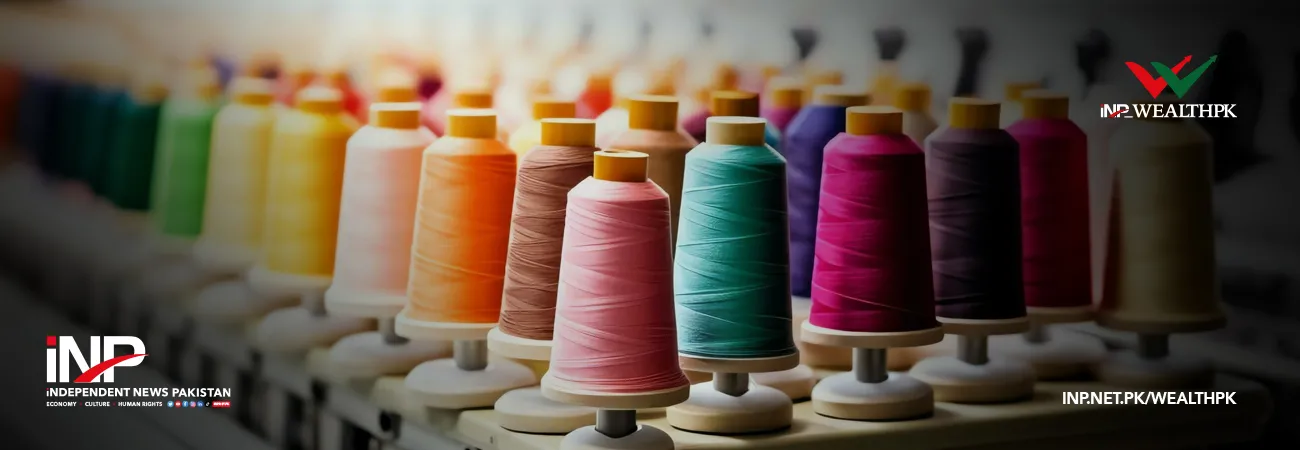INP-WealthPk
The Pakistan Textile Council (PTC) has called on the government to adopt regionally competitive energy tariffs, rationalized taxation, and a legally backed five-year industrial and export policy to ensure long-term stability for the country’s largest export-earning sector. The proposals were outlined in the Council’s Pakistan Textile & Apparel Exports Q1FY26 report. According to the report, Pakistan’s textile and apparel exports reached $4.79 billion during the first quarter of FY26, marking a 5.7 percent rise over the same period last year.
Yet, the Council warned that this progress remains fragile as the industry continues to face high electricity and gas tariffs, policy uncertainty, and liquidity constraints that reduce competitiveness in global markets. The Council emphasized that a predictable and regionally aligned energy pricing regime is crucial for export-oriented industries. It proposed a transparent mechanism that pegs industrial energy tariffs to levels in key competitor countries, such as Bangladesh and Vietnam, to remove uncertainty and restore cost parity.
The report noted that uncompetitive power prices have become one of the single largest impediments to sustained export expansion. The PTC also called for rationalization of taxes and quicker refund mechanisms. It recommended a 72-hour automated refund process under a risk-based post-audit system and advocated zero-rating of export-related inputs under the Export Facilitation Scheme to ease cash-flow pressures. Delayed refunds and complex documentation, the Council said, have trapped exporters’ working capital and discouraged new investment.
On labor costs, the report urged alignment of wage and overtime regulations with regional standards to reduce the cost gap with Bangladesh and other competitors. It noted that while Pakistani manufacturers have upgraded technology and compliance systems, they remain disadvantaged by higher payroll costs, which erode price competitiveness in major markets such as the EU and US. To strengthen exporters’ financial resilience, the PTC proposed enhancement of export-linked credit facilities, including expansion of the Export Finance Scheme (EFS) and Long-Term Financing Facility (LTFF).
It also called for the EXIM Bank to be strengthened with a larger mandate and higher lending limits, enabling financing for modernization, renewable-energy installations, and innovation-driven investments. Beyond short-term measures, the Council stressed the need for a comprehensive five-year industrial and export policy to replace ad-hoc regulatory orders that disrupt planning. It argued that frequent changes in energy tariffs, taxes, and import duties create uncertainty and deter investors from scaling operations or upgrading production lines.
The proposed policy, according to the report, should include legally defined Key Performance Indicators (KPIs) monitored on a monthly basis to ensure transparency and accountability. These KPIs would track export growth, diversification, compliance standards, and progress on sustainability goals. A consistent reporting framework, the Council added, would build confidence among both local manufacturers and foreign buyers. The PTC recommended that the government’s long-term policy be aligned with global sustainability and ESG requirements, particularly in energy efficiency, wastewater treatment, and traceability of raw materials.
International buyers increasingly demand these standards, and Pakistani exporters must be supported through concessional financing and technical assistance to meet them. In addition, the report highlighted the importance of fostering innovation and product diversification to increase Pakistan’s global market share. Incentives tied to value addition, compliance with the Sustainable Development Goals (SDGs), and green-project financing would allow textile producers to move further up the value chain. The Council also urged the creation of a policy-stability framework with legal cover, ensuring that export-oriented industries are shielded from sudden fiscal adjustments or energy-price shocks.
It recommended issuing monthly implementation updates and maintaining transparent coordination between federal and provincial authorities as steps to foster sustained confidence in the policy environment. Concluding its recommendations, the Pakistan Textile Council stated that Pakistan’s export momentum can be maintained only through coherent structural reforms. Ensuring competitive energy pricing, predictable taxation, modern financing facilities, and a stable long-term industrial policy will not only safeguard current export levels but also position the country’s textile sector as a globally competitive, sustainable, and innovation-driven industry.
Credit: INP-WealthPk









